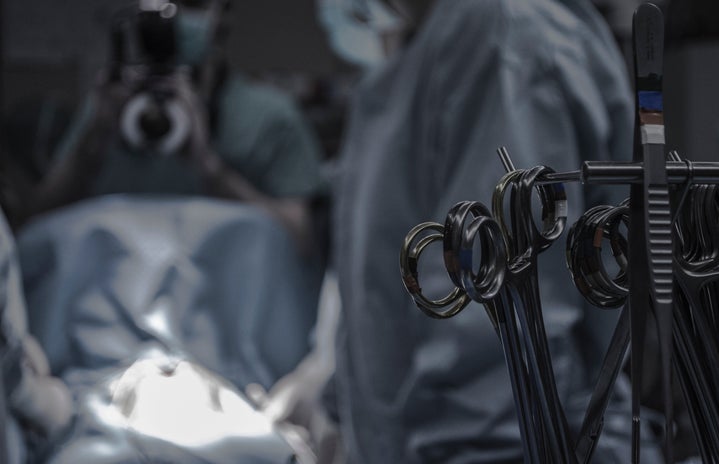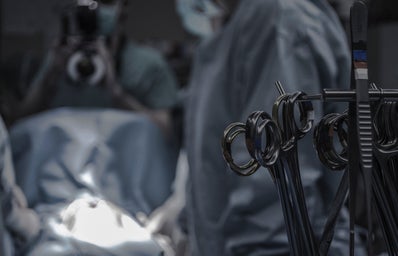“We think you have endometriosis.”
“Endo-what-now?”
At 17-years-old, most kids are thinking about prom, university, and their weekend plans. Don’t get me wrong, I was too. I was going to dress fittings and my friend’s hockey games, but I was also carrying this huge weight that affected every single aspect of my life.
I was diagnosed with a disease called endometriosis two months after my 17th birthday. Endometriosis is defined as “an often painful disorder in which tissue similar to the tissue that normally lines the inside of your uterus — the endometrium — grows outside your uterus.” The disease affects an estimated 1 in 10 women during their reproductive years. There is currently no cure for the disease.
My story
I felt excruciating pain during my first period at 12-years-old and it just never really stopped. After misdiagnoses and multiple doctors, I met my first specialist at Children’s Hospital when I was 15-years-old. Endometriosis was put on the table immediately. My symptoms matched up with it but they couldn’t officially diagnose me without surgery, which I was too young for at the time.
I spent the majority of my teen years on and off medications as they tried to figure out how to help me. I attended to physiotherapy and counselling through the hospital. Nobody could figure out how to help me. It felt like I was in a game of hot potato, being tossed around from doctor to doctor. None of them knew what to do with me.
The summer before my senior year, doctors offered me the option of surgery. My specialist and my parents said the decision was up to me because I was old enough to sign the papers myself. I knew I couldn’t live like this anymore, and I needed answers. So I signed the papers and cried the whole car ride home.
Surgery was the most emotionally and physically painful experience I have ever lived through, but it was also the best decision I have ever made. I was officially diagnosed with endometriosis and they removed as much of the tissue as they could. The material can regenerate (and usually does) but I felt like I had my life back. I would do it all over again tomorrow.
Signs and symptoms
Endometriosis is a complicated disease, with some women experiencing high levels of pain, and others who feel little to nothing. However, the common symptoms according to Healthline include:
-
Painful periods
-
Heavy bleeding during menstruation
-
Pain during sex
-
Lower back pain that occurs around the time of menstruation
-
Cramps one or two weeks before period
These are the most common symptoms, but the best way I know to describe this to other women is simply: if you have extreme pain during your periods, that is not normal and you can get help.
Resources
If you or someone you know may have endometriosis, here are some resources to get you started:
1.Your family doctor.
The first resource to turn to should be your doctor. My first step to finding my answers was a simple visit to my family doctor. She told me that I just had painful periods, but my parents and I pleaded for an ultrasound, which is the next step on my path.
2. The World Endometriosis Society.
This was one of the first websites I visited when I learned about the disease. They have great information on endometriosis and are constantly working to advocate for others on the world stage.
3.The Center for Young Women’s Health.
I wish I knew this existed when I was in the process of being diagnosed. They focus on educating young women about the disease, the medications available, and other treatment options.
4. Support groups.
These are huge for me. I’ve been to ones in person, but I personally felt a little out of place due to my age. Online support groups have been successful for me, including Nancy’s Nook (which provides information on endometriosis and sets women up with skilled surgeons in their area) as well as Instagram and Reddit endometriosis support pages.
5. Mental health support.
There’s been tons of research that shows the connection between women suffering from endometriosis and mental illnesses. This is an aspect I often overlooked when I was first seeking treatment, but as of lately have felt necessary to look into. Resources such as “Good2Talk” (ages 17-25) and “Kids Help Phone” (ages 5-20) exist to help you. Take care of yourself.
My future and yours
As of now, I’m taking a medication specifically for endometriosis, one that is also used in other instances as a chemotherapy drug (so fun, as you can imagine), as well as a slew of other painkillers, vitamins, and supplements. But I’m doing okay.
New research is coming out every day about endometriosis. Doctors are working to find new ways to not only ease the pain that comes with all of this, but also to find a cure. My current medication wasn’t available until two years ago which goes to show how quick things can change.
Talk to your family and friends about how you’re feeling and what you need. In the beginning, I didn’t tell anyone about my diagnosis because I wanted to be as “normal” as I could be. But the truth is, I am different, and that’s okay. Let your family and friends be there for you and hold your hand through this. They want to be there for you.
Most of all, know that you are worth fighting for. For the longest time I didn’t think it was worth it to fight through all of this. Some days I still think like that. However, I know now that I deserve to live a happy and healthy life, just like anyone else. You deserve to live a pain-free, happy life and that simple statement is always worth fighting for.
I don’t know what’s waiting for me, or what pain I’ll feel today or tomorrow, but I do know I’ll never face it alone. I know that I’m always worth fighting for.
I hope you know that you are too.



